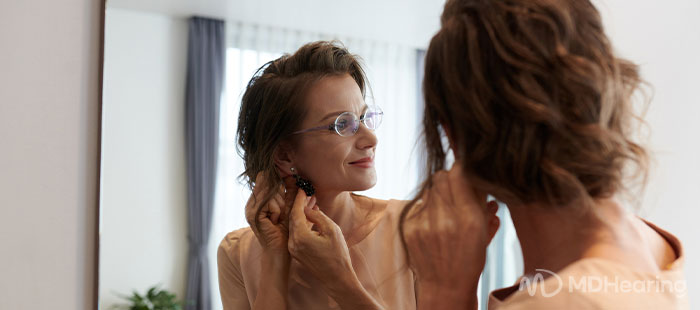If you’ve been considering hearing aids but have concerns about comfort, you’re not alone. Many people worry about how hearing aids will feel or if they’ll fit properly. We want to address these concerns to help you make an informed decision and ensure that your hearing aid experience is as comfortable and effective as possible.
Think of it like breaking in a new pair of shoes—initially there may be some minor discomfort, but with the right size, adjustments, and time, they become comfortable.
Let’s take a closer look at some common concerns and how hearing aids from MDHearing are designed to overcome them.
1. Physical Fit and Security
One of the most common concerns people have about hearing aids is physical discomfort. Some individuals worry that their hearing aids may not fit properly, could fall out, or shift out of place. This can make people hesitant to wear them regularly, affecting their overall hearing experience.
Overcoming Fit and Security Concerns:
Comfort is a top priority for MDHearing. Hearing aid technology has come a long way, and modern devices are designed to be lightweight, comfortable, and to stay securely in place. Our licensed hearing professionals will work with you to ensure that your hearing aids fit your unique ear anatomy. We have many sizes and shapes of tubing and tips available to help you achieve a comfortable and secure fit.
2. Ear Discomfort and Skin Sensitivity
Another concern people have about hearing aids is the possibility of irritation in or around the ear, pressure on the ear canal, or soreness from prolonged use. While these issues can occur, they’re often temporary or can be resolved with the right adjustments.
Overcoming Discomfort and Skin Concerns:
Rest assured, the materials used in MDHearing’s hearing aids are skin-friendly and hypoallergenic. If you have any skin sensitivities, we'll provide guidance on proper care to minimize any potential issues. Additionally, our hearing aids and ear tips are ergonomically designed to fit your ear canal comfortably without being too tight or too loose. As mentioned above, we have various sizes and styles available, so you can find what feels best for your ears.
3. Noise Feedback (Whistling Sounds)
Another concern is the issue of feedback or whistling sounds that some hearing aids may produce. Feedback occurs when sound from the hearing aid's speaker is picked up by the microphone, creating an annoying loop of amplified sound. This can be distracting and uncomfortable, causing people to remove their hearing aids and be reluctant to wear them.
Overcoming Feedback Concerns:
MDHearing hearing aids come equipped with advanced technology to reduce feedback and improve sound quality. If feedback is ever an issue, we'll work with you to make sure the hearing aids are fitted properly, free of any debris that can cause whistling, and help you adjust the settings to ensure your hearing aids are functioning properly.
4. The Initial Adjustment Period
When you first start wearing hearing aids, it may feel unfamiliar or strange. The sensation of having something in your ear can take some getting used to, and your brain needs time to adjust to hearing sounds you haven’t heard in a while. With a little patience and adjustment, most people adapt to their new hearing aids quickly.
Overcoming Adjustment Period Concerns:
MDHearing will guide you through the adjustment period, providing education on what to expect and how to wear your hearing aids comfortably. The more you wear your hearing aids, the faster your brain will adapt. Many people find that after a few days, the feeling becomes second nature. If any discomfort arises, we're here to assist and ensure a smooth transition.
5. Aesthetics and Visibility
Worried about how your hearing aids will look? It’s a common concern that often deters people from getting the hearing help they need because they don’t want to look “old”. However, many people find that the benefits of better hearing far outweigh any initial self-consciousness. Not to mention, constantly saying “what?” and asking others to repeat themselves makes you seem much older than wearing a hearing aid and being able to participate in conversations.
Overcoming Aesthetics and Visibility Concerns:
Hearing aid technology has evolved significantly, and there are now many discreet, nearly invisible options available. MDHearing offers a range of hearing aids, including tiny in-the-ear models that hide completely in the ear canal, and small behind-the-ear designs that rest discreetly behind your ear. Our goal is to help you find a style that fits both your hearing needs and your aesthetic preferences.
6. Glasses and Other Accessories
Many people enjoy or need to wear accessories around their ears, and you might wonder if they will fit with your glasses, nasal cannula, mask, or other items. Fortunately, many people wear glasses or other accessories at the same time as hearing aids without issue.
Overcoming Glasses Concerns:
MDHearing offers both in-the-ear (ITE) and behind-the-ear (BTE) styles of hearing aids. With ITEs, the hearing aids sit entirely inside your ear, so there is nothing that will interfere with glasses or other accessories behind your ear. And although BTE hearing aids do rest near the arm of glasses, they are designed to fit sleekly next to your glasses, behind your ear—no special accessories needed. We’ll help you find a hearing aid style that works well with your glasses, ensuring both your hearing and vision needs are met without discomfort.
Final Thoughts
Understanding how to cultivate comfort with hearing aids is key in maximizing the benefits of these devices. With the right knowledge, technology, and support, you can enjoy improved hearing while feeling comfortable and confident.
MDHearing is unique in the OTC hearing aid world when it comes to supporting you. Similar to hearing clinics, we have a full staff of licensed audiologists and hearing specialists that are all based in the U.S. and available to assist you. However, unlike hearing clinics, you don’t have to pay thousands of dollars for this support. Our clinic-level customer care comes free with your hearing aids and our professionals can be easily reached by email, text, phone, or web chat. We also offer one-on-one video chat appointments through our VIP care program.
If you have any concerns about hearing aid comfort, don’t hesitate to reach out to our team. We’re here to help you find the perfect solution for your needs and reconnect with the world.
Contact our licensed hearing specialists for free clinic-level support whenever you need it.
CONTACT US

